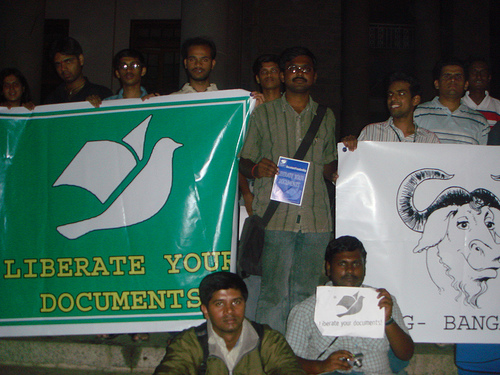

From the Campaign for Document Freedom
20 August 2008 (Microsoft corrupts the ISO)
Microsoft consummated its corruption of the International Standards Organization, which dismissed an appeal by several countries against the approval of OOXML.
However, I think the EU's criminal investigation of this corruption is still live. (Is it?)
Software patents are rejected by Indian Parliament in 2005 (Patent Amendment bill 2005). But Indian Government is now trying to push it through back door by bringing a Patent manual. Public consultations on this draft manual is going on in various metros in India. Bangalore Consultation is scheduled for the last week of August.
The Candle light vigil to "Say No To Software Patents" is a occasion to raise civil society voice against this back door trojan to Indian patent system.
On 23rd August 2008 in front of Town Hall near Corporation Circle, Bangalore. Publicity campaigns will be hosted in various places on 22nd.
Nothing could be further from the truth. As explained above, software patents are bad for everyone other than large companies. Each software patent is a potential mine in the path to progress for small software companies. Allowing software patents in the country will be like strewing the path with mines.
As much as I utterly despise the entire premise of Intellectual Monopoly, this is about violating the principles of a Free License, and if it's good enough for the British government to violate our civil rights in the name of Intellectual Monopoly, then it's good enough for the Free World to protect its "property" (in fact Freedom) too…
A book on (gulp) law? Why would I want to read this? Well, if you're a developer (open source or not) and you are at all interested in protecting the fruits of your labors, you will want to know this the same way you want to know about locking your house when you leave for work each morning. The next question is, "Will I understand anything the author is saying?". Depends. If you're an attorney, the answer is "yes". If you're a software engineer, the answer is..."yes". What? How can that be? Turns out the author is both a software engineer and a practicing attorney (at least, according to the blurb on the back cover of the book). Is it possible he can speak to both audiences? Let's find out.